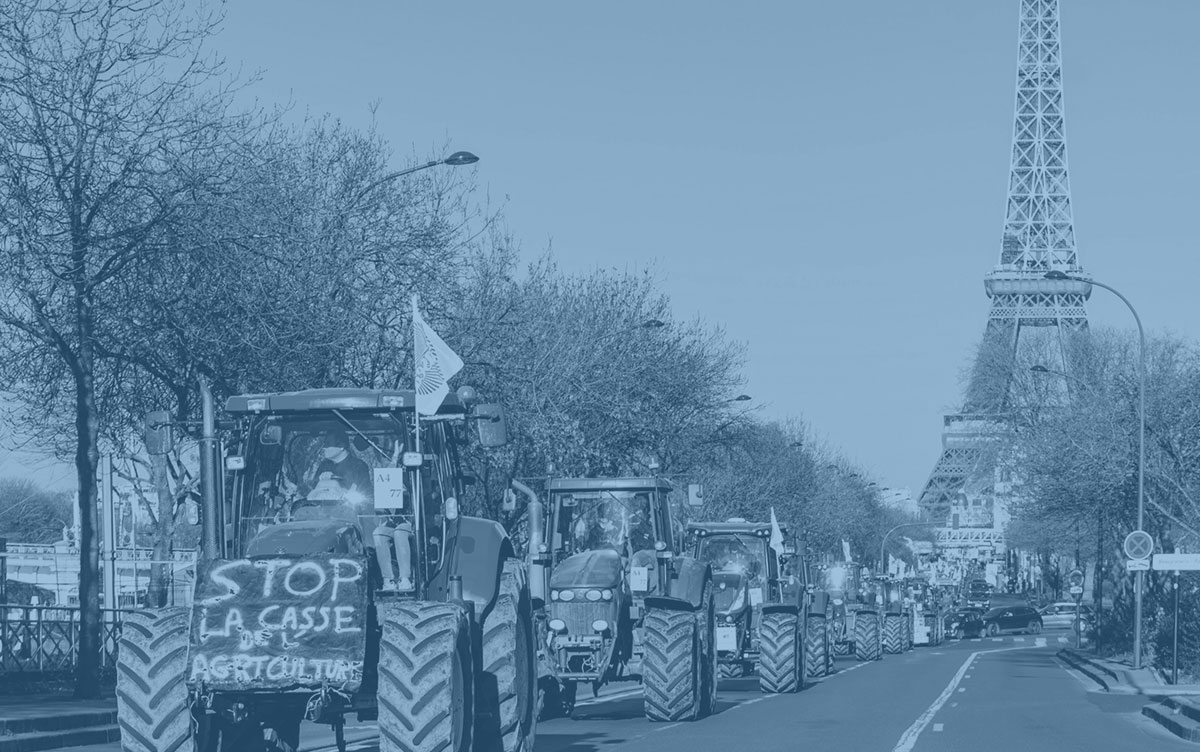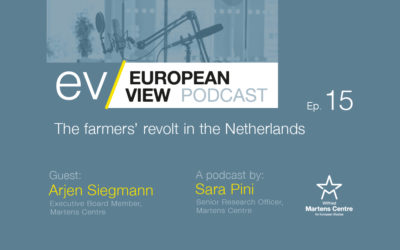The 2024 European Elections are a Crucial Vote for France’s Political Future
28 February 2024

The turbulent nature of Macron’s second term in office, discontent among farmers, and a general sense of pessimism, all loom over France’s European election landscape. Latest forecasts suggest an unprecedented electoral victory for the far-right. The summer European elections also serve as a prelude to the 2027 election year, when Macron will not be running due to term limits. At their core, the European elections in France are another avenue to manifest the ongoing struggle between President Macron and Marine Le Pen’s Rassemblement National [RN].
France is not alone in experiencing these dynamics; a strong wave of far-right politics is currently sweeping across the EU. The political situation in France is a good reflection of the overall political atmosphere and level of support for these parties across the continent. In France, the far-right RN is forecasted to receive up to 28,5% of the vote in the June European elections. If realised, this result would be the party’s best electoral outcome in a European ballot ever.
Until now, the RN has proven to be remarkably resilient and even surprisingly unified compared to other political blocs in the country. In French political culture, it is common for party unity to regularly crack, even to the extent of changing a party’s name to better reflect new identities. The most recent major split in the country’s domestic politics occurred last summer when the second-largest parliamentary group, the left-wing NUPES coalition, disintegrated. Simultaneously, hopes for significant success and electoral victory for the French left in the upcoming European elections were dealt a significant blow.
The most popular faction of the fragmented left is the Socialists, who still only garner around 9.5% support. The Socialist party’s leading candidate is former filmmaker and current MEP Raphaël Glucksmann, who seeks to portray himself as a pro-EU federalist alternative to Macron’s policies. Glucksmann is also known for his strong stance as an advocate for Taiwan, a critic of China, and defender of the Uyghurs. The traditional centre-right Republican party has nominated sitting MEP François-Xavier Bellamy as their leading candidate, but the party’s support remains only around 8.5% of voters.
An Informal Referendum on Macron
The latest approval ratings for French President Macron have been catastrophically poor. The sitting president’s Renaissance party is expected to receive only about 18% of the vote. It seems the European elections will serve in France as an informal referendum on the President’s policies, as opposed to those of the RN. The situation is somewhat similar to the 2019 European elections, when Macron had been President for two years, and opposition forces tried their best to create a similar political scenario around the European elections. The RN just barely edged out Macron’s party coalition in that contest, with both blocs getting 23 seats each.
A “referendum” on Macron’s policies is clearly the goal of RN leader Jordan Bardella. His party aims to highlight Macron’s perceived failures in immigration policy, internal security, and secularism. According to them, France stands at a crossroads, and two sharply contrasting visions and choices are available to voters. Macron represents increasing immigration, unfavourable globalisation, and a growing subservience to the United States. The alternative is the policy advocated by the RN, which emphasises a return to genuine, democratic nationhood. When examining their claims and accusations against Macron’s policies over the past seven years, it is evident that their strategy has not evolved much over time.
Selling European Strategic Autonomy as the Agricultural Crisis Looms
In the current domestic political climate, Macron’s vision of EU strategic autonomy and sovereignty fails to capture significant interest among citizens. Instead, attention has turned towards the challenges within the agricultural sector. France holds the distinction of being the largest and most significant agricultural state in Europe, where the country’s food production holds both commercial and cultural significance. Over the past two years, French farmers have experienced increasing distress, mirroring trends seen in other parts of Europe. The market situation has worsened due to falling producer prices and rising production costs.
Throughout his presidency, Macron’s goal has been to make the EU a global political force alongside China and the USA. Against the backdrop described above, it is no wonder that the President continues to lose popularity. According to the latest polls, his own approval rating is around 20%, only about two percentage points more than the support polls show for his centrist alliance. Another problem is that the Renaissance party currently has no leading candidate for the European elections, as the presumed candidate, Stéphane Séjourné, became the Foreign Minister during a recent cabinet reshuffle.
The 2027 Presidential Campaign Begins with the European Elections
The European election landscape in France seems very clear at first glance. Attention is particularly focused on the battle between the Renaissance party and the Rassemblement National. Behind the scenes, the presidential game is already in full swing. A possible electoral success for the RN would provide an excellent starting point for Marine Le Pen’s next presidential campaign. The president himself has concretely reacted to his weak approval ratings by deciding to replace several key ministers. Prime Minister Elisabeth Borne was replaced by former Education Minister Gabriel Attal, who is currently France’s most popular political figure according to polls. If Attal succeeds in his difficult task as Prime Minister, he may also be a viable presidential candidate in the 2027 election; the European elections will constitute his first major test. As it stands, Attal and Macron both have a tough road ahead to avoid an embarrassing, and potentially politically fatal European election.






